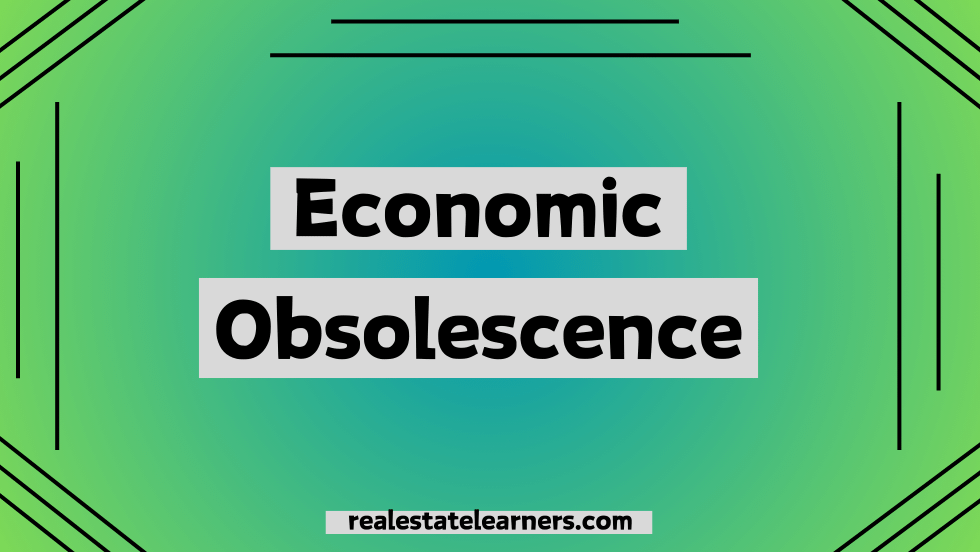Real estate is a valuable asset that holds great importance in the economy. From residential properties to commercial structures, real estate plays a very crucial role in shaping the economic landscape of a country.
While many factors contribute to the value of a property, one aspect that often gets overlooked is economic obsolescence. This post will guide you through the concept of economic obsolescence in real estate and its impact on property values.
What is economic obsolescence real estate?
Economic obsolescence, also known as “external obsolescence”, refers to the reduction in the value of a property due to external economic factors. These factors can include changes in the surrounding neighborhood, market demand shifts for specific properties or overall economic downturns.
One key aspect of economic obsolescence is that it is considered to be an “outside influence” on the property, meaning that it is beyond the owner’s control. Unlike physical or functional obsolescence, which renovations and upgrades can address, economic obsolescence cannot be easily fixed.
Economic obsolescence can significantly impact a property’s value and, ultimately, its potential for profitability. For example, if a significant employer in the area shuts down, the demand for housing in that neighborhood may decrease, resulting in lower property values. Similarly, if a new highway or airport is built nearby, it can increase noise pollution and reduce the area’s desirability, leading to decreased property values.
Example of economic obsolescence:
The decline of brick-and-mortar retail
A prime example of economic obsolescence in real estate is the decline of brick-and-mortar retail stores. With the rise of online marketting, traditional retail stores have struggled to compete, leading many to shut down or declare bankruptcy.
This trend has been further accelerated by the COVID-19 pandemic, which has forced many businesses to close their physical locations and shift to online sales. As a result, properties that were once highly desirable for commercial use are now facing economic obsolescence due to decreased demand for physical retail space.
In addition, the rise of e-commerce has also led to changes in customor behavior, with more people opting to shop from home rather than visit traditional brick-and-mortar stores. This shift in market demand has significantly impacted the value of properties that were once considered prime retail locations.
What are the Responsible Factors for the economic obsolescence real estate?
Several responsible factors can contribute to economic obsolescence in real estate. Some of the most common include changes in government policies or regulations, shifts in demographics and population trends, and technological advancements.
Government policies and regulations can have a significant impact on property values. For example, suppose a new zoning ordinance is put in place that restricts certain types of development, such as height restrictions for buildings. In that case, it can significantly decrease the value of affected properties.
Demographic shifts and population trends can also majorly influence economic obsolescence. As populations age and preferences change, certain properties may become less desirable, leading to decreased demand and lower values.
An example could include a decrease in demand for large single-family homes as the population ages and more individuals opt for smaller, low-maintenance properties.
Technological advancements can also play a role in economic obsolescence. For example, online shopping has dramatically impacted brick-and-mortar retail properties, as more consumers opt for the convenience of shopping from home. This shift in consumer behavior has decreased demand for traditional retail spaces, resulting in economic obsolescence for many properties.
Another factor that can contribute to economic obsolescence in real estate is high crime rates. Properties in areas with high crime rates are often seen as less desirable, leading to decreased demand and lower property values.
High crime rates not only drive away potential buyers or tenants but can also make it more difficult for landlords to find reliable tenants and maintain steady rental income. This can ultimately lead to financial strain and decreased profitability for the property owner.
How to Address Economic Obsolescence in Real Estate?
Conduct thorough market research: One of the best ways to address economic obsolescence is by conducting extensive market research. This can help identify potential external factors that may impact the property’s value and allow owners to make informed decisions about how to mitigate them.
Stay up-to-date on government policies and regulations: As mentioned earlier, changes in government policies and regulations can significantly impact property values. Owners need to stay informed about any potential changes that may affect their properties and be prepared to make necessary adjustments.
Consider making improvements or upgrades: While economic obsolescence cannot be easily fixed, certain enhancements or upgrades to the property can help increase its desirability and value. For example, investing in energy-efficient features or modernamenities can make the property attractive to potentialbuyers or tenants.
Diversify the property’s use: If a property primarily depends on one specific use or industry, it may be more susceptible to economic obsolescence if that industry experiences a downturn. By diversifying the property’s use, owners can mitigate this risk and attract a wider range of tenants or buyers.
Collaborate with local organizations and businesses: Building relationships with local organizations and businesses can help increase the property’s visibility and desirability. For example, partnering with a nearby university or hospital can attract potential tenants who work in these fields while also providing a steady stream of potential customers for retail spaces.
Consider seeking professional assistance: In some cases, it may be beneficial to seek the help of professionals such as real estate agents or consultants who specialize in dealing with economic obsolescence. They can give valuable insights and strategies for addressing these issues and potentially increase the property’s value.
What are the long-term effects of economic obsolescence in real estate?
Decreased property values: Economic obsolescence can significantly decrease the value of a property, making it less attractive to potential buyers or tenants.
Financial strain for property owners: If a property’s value decreases due to economic obsolescence, it can also lead to financial strain for the owner. This is especially true if they have invested significant capital into the property.
Difficulty in obtaining financing: Lenders are less likely to fund properties experiencing economic obsolescence, as they are considered higher-risk investments.
Lower rental income: Economic obsolescence can also result in lower rental income for landlords and property owners. This can make it difficult to cover expenses and maintain profitability.
Potential for foreclosure or bankruptcy: In extreme cases, economic obsolescence can lead to foreclosure or bankruptcy for property owners who cannot manage the financial strain caused by decreased values and rental income.
Negative impact on surrounding properties: Economic obsolescence in one property can also hurt surrounding properties, potentially leading to a decline in the overall neighborhood or community. This can create a cycle of declining property values and desirability.
Conclusion
Real estate agents, students preparing for the exam, investors and professionals must understand economic obsolescence thoroughly. This knowledge can help them accurately assess the value of a property and make informed decisions when investing or managing properties.
Economic obsolescence is a type of depreciation that results from external factors and can have long-term effects on a property’s value and profitability. Property owners can mitigate its impact and potentially increase the value of their investments by staying informed, conducting thorough research, and considering various strategies to address economic obsolescence. So, it is crucial to constantly monitor market conditions and make necessary adjustments to avoid economic obsolescence in real estate. With this knowledge, investors and professionals can make sound decisions that ultimately lead to a successful real estate investment portfolio.

Corey has over 15 years of experience as a real estate broker and educator. He is dedicated to providing valuable insights and guidance for those looking to enter the real estate industry.

